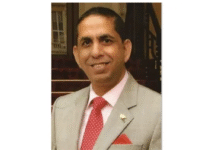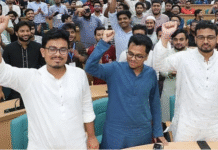The Daily Star

What happened recently in Barishal between a local mayor and an Upazila Nirbahi Officer (UNO) is not the real story. Why it happened is. And in that story is hidden many facets of the crucial issue of the state of our governance. It happened because of a bitter political rivalry within the party and the unhealthy practice of dragging public servants into the fray to serve the agenda of politicians.
It was not a small incident. A total of 50 people got injured. Two ruling party leaders—one of them the local MP who is also a state minister, and the other the local mayor—are fighting for supremacy in the district. The local UNO, Munibur Rahman, got dragged into the melee and was targeted by the mayor, who comes from a very powerful political family and who, according to local reports, has now arrogated to himself the power to override all administrative prerogatives. The UNO’s house was attacked by the staff of the city corporation, allegedly led by the mayor’s men, which resulted in the UNO calling for police protection, which in turn led to firing by the law enforcement officers and finally ended up in police cases filed against the mayor.
The event became more revealing after the Bangladesh Administrative Service Association (BASA) reacted to it. In a press release dated August 19, it stated that “the incident shows how a government servant became victim in the hands of Mayor Serniabat Sadiq Abdullah and his city corporation goons”, and termed them to be “rajnaitik durbritta” (political thugs/criminals). The press release further said that the mayor had put up many barriers in the work of the administration and was terrorising the whole district. BASA demanded the arrest of the mayor and hoped that the law would take its own course.
The mayor countered by lodging a set of his own cases against the UNO, accusing him of attempting to kill him.
Of course, the incident was not allowed to brew further. It was soon explained to have arisen out of “misunderstanding” and steps were taken to patch things up.
The event in Barishal is a microcosmic representation of the district-level rivalries that are going on in many parts of the country, among various aspirants of the ruling party for total control of their respective districts. The fight is usually, but not always, between the local member of parliament and the district leadership. This malaise is afflicting almost every district of the country today. When there is virtually no political opposition at the grassroots level, intraparty squabbles intensify resulting in splitting the local units and turning fellow party workers into mutual mortal enemies. This obviously makes a mockery of party discipline—something that is almost non-existent even at the best of times—and opens up avenues for the rise of local hoodlums who are then used to disrupt the activities of their rivals in every possible manner, including violence. Thus local politics becomes more and more about violence, and less and less about public concerns.
The propensity for violence—nothing new in our politics—leads to the rise of musclemen and the gradual decline in participation of politically conscious elements. In time, the party becomes filled with thuggish elements whose main purpose in joining politics is to extract benefits—and that’s what they do, destroying the reputation of the party and eroding public support for it. Just as in economy “bad money drives out good money”, Gresham’s law also applies in politics, where hoodlums drive away genuine political elements from overall politics, allowing the vacuum so created to be filled up by the criminal elements. Thus criminalisation takes over local party politics to the detriment of politics in general, and ruling party politics in particular.
Leaders, on their part, to maintain their hold on these so-called “party workers”, give in to their demands and, as it happens all the time, they themselves become deeply involved in it and end up leading this process. This is the inevitable fate of parties who have been in power for a long time and who successfully, politically or otherwise, have destroyed all democratic opposition.
Then there is the vitiation of the process of law itself. Instead of the law taking its own course, it suddenly stops in its tracks. As a result of an understanding between the rival groups, legal process suddenly stops. Why? After all, guns have been fired, a house was attacked and 50 people in all were injured, some with bullet wounds. We are aware of civil cases where contesting parties may come to an “out-of-court” settlement. But for criminal acts?
Whatever may have been the merit of the BASA statement—facts on the ground prove that the allegations deserve to be looked into—the language used in the press statement shocked and surprised all, calling the mayor, an elected person, and his followers “durbritta” (criminal elements) and demanding the mayor’s arrest. This is something very unusual in the administration’s dealing with public representatives, where the elected representatives of the people are always supposed to be the “political masters” of the administration. How did the bureaucrats garner the courage to use such language against an elected representative? The answer has two sides to it: 1) The politicians are themselves denigrating their honour, dignity and prestige by what they do and by the people they patronise, and 2) Bureaucrats are not as disciplined as before, and have been significantly politicised and drawn into local politics.
This brings us to the delicate question of the relationship between the political leadership and bureaucracy in a democratic system, and how they should function for the benefit of the people. This is a vital question for any country, more so Bangladesh, a lower middle-income country which is on track to graduate from the UN’s Least Developed Countries (LDC) list in 2026.
In their seminal book “Why Nations Fail” (2012), Daron Acemoglu and James A Robinson made a simple proposition: countries that build “institutions” are able to sustain their development, while those who do not falter after a while. It is only the institutions that guarantee sustainability; everything else may ensure success for a while, but in the long term they all falter.
Of all the institutions that form the integral part of the governance process of a country, civil administration is among the most important. In Bangladesh, it is made up of a huge and complex structure consisting of, according to latest official figures, 15,04,913 officers and staff. For officers, who are divided into 26 cadres, we spend Tk 11,000 crore to pay salaries, and another Tk 26,000 crore for the staff per year. A staggering Tk 33,000 crore is spent for various perks for the above officers and staff each year. What we have here is a total of Tk 57,000 crore, making for 19 percent of our revenue budget that we, the tax payers, dish out annually. In 2015, the pay scale for the civil administration was doubled. A special interest-free car loan facility of Tk 30 lakh was allowed for officers of the rank of deputy secretary and above (administration cadre) with a monthly car maintenance allowance of Tk 50,000.
For all that, we, the public, are supposed to get a clean and honest bureaucracy. Pay and allowances are not the issue here. Efficiency, transparency and accountability are. In fact, we would want everybody who works for the government to be justly paid for the services that they render. But who will ask what is the quality of service they render and how satisfied the public (whose tax money is the basis of all salaries and perks) are? The general public, the sources of all power in our “People’s Republic”, are never asked as to what their evaluation is of the services they get from our public servants. In fact, the term “public servant” itself seems more like a mockery as the public is made to feel like the “servant” instead of the other way around.
Has there ever been any study, research or investigation about how efficiently our administration is working? How long does it take for a file to pass through all the stages of government requirement? Has that timing improved? If not, then why? With the rising cost of bureaucracy, shouldn’t efficiency become a must?
Then comes the question of transparency and accountability. Do we really know why certain cases are solved smoothly, while other cases are not? After all, if the ultimate purpose of public administration is to serve the people, then our bureaucracy should be subjected to all the modern accountability process that bureaucracies in other democracies are subjected to. Do we really search to find out why so many projects are delayed repeatedly, with huge increments in costs? Whose money is being so recklessly spent? Our planning minister recently lamented how his efforts to monitor projects are repeatedly thwarted.
According to a letter sent by the chairman of the Anti-Corruption Commission (ACC) to the cabinet secretary, a “huge” number of civil servants own and run businesses on the side violating their service rules. These government servants have either become contractors in their own names or in the name of their dependents, said the letter, sent on March 29. “The commission thinks such practices should be stopped immediately,” the letter said. Section 17 (1) of the Government Servants (Conduct) Rules, 1979 forbids a public servant from engaging in any trade or employment. Section 17 (3) says not to permit any members of a public servant’s family to engage in any trade over which said government servant has jurisdiction. Till date, we are not aware of any action being taken on this score. Normally such a letter should have created a storm. In this instance, if there was a storm, it was confined to a tea cup.
As stated earlier, graduating from the LDC status also means that we have to establish a more efficient administrative system that is commensurate with the modernisation process that we have embarked on. Tax payers will keep on footing a higher and higher pay bill for our bureaucrats, but their service, attitude and efficiency level will remain the same—this cannot be the ideal way forward for a country aspiring to be the “model” for development.
The Barishal incident and the letter of ACC chairman to the cabinet secretary make the question “Who do our public servants serve?” so much more urgent and relevant.
Mahfuz Anam is Editor and Publisher, The Daily Star.


 For all latest news, follow The Daily Star’s Google News channel.
For all latest news, follow The Daily Star’s Google News channel. 







